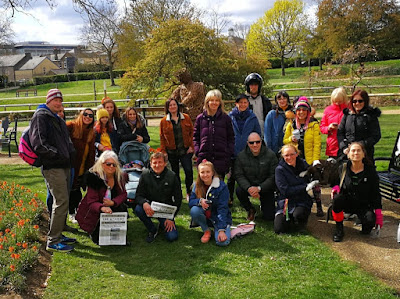A Thorough Review
Yes, I'm talking about the vaccine. Again. Because since distribution began, 17 European countries have placed Oxford/AstraZeneca on hold due to concerns over blood clots. You know, the same concerns that I was mocked and hated for having only last month.
I apologise if that comes across as bitter and hurt - it's only because I am.
Today the BBC released a baffling article about the "thorough" review that AstraZeneca has undergone. So here is my thorough review of their flimsy attempt to stay with the official line.
"The MHRA and the EMA say people can have confidence in the vaccine's benefits and should get immunised, despite some countries pausing use.
But anyone with a headache lasting more than four days after vaccination should seek medical advice, as a precaution.
The same advice applies if someone develops unusual bruising."
So... you should get it, but if you get symptoms of the blood clots that they definitely don't cause, seek medical attention. Hmm. Go on..
"That is because the regulators have received a very small number of reports of an extremely rare form of blood clot occurring in the brain.
In the UK, five cases of cerebral sinus vein thrombosis (CSVT), among 11 million people who have received the vaccine, occurred in men aged between 19 and 59. One of these was fatal.
The EMA has received an additional 13 reports of CSVT.
CSVT can occur naturally and no link to the vaccine has been established"
If it's "extremely rare", and 18 people have suddenly suffered from it who are all well outside of the common age for a stroke to occur, who all have a recent medical procedure in common, why isn't that a link?
"Covid infection can make clots more likely."
SO. Not only did these people all have a recent medical procedure in common, said medical procedure is linked to an infection that can make clots more likely.
"The patients also had low blood platelet counts - cells involved with clotting."
Platelets are indeed cells involved with blood clotting, but this excerpt is clumsily worded to make it sound like low blood platelets make clotting more likely. Actually, platelet cells make the clots. Fewer platelets = less risk of clot. These people had low blood platelets, meaning they wouldn't normally be at risk of a clot. Something would have had to happen - perhaps something entering the blood stream - to induce a clot in someone with a low platelet count.
This is why I have described the article as baffling: the theme is "it wasn't the vaccine we promise", but the details connote no other possible explanation.
Also, the article only acknowledges the victims of CSVT - rare blood clotting in the brain. Other more common types of stroke may have gone unlinked. And what if the blood clots nearer the heart? Or anywhere, really. Why risk it?
The effects that are more naturally occurring are harder to link back to the vaccine, but once there's clear correlation between AstraZeneca and one form of blood clot, other impacts should at least be recorded to see if it's more than would usually occur. And a more thorough investigation is warranted than this flat-out unfounded denial.
"Innocent until proven guilty" applies to human beings, not new medical substances still in the trial stage.
https://www.bbc.co.uk/news/health-56447367
https://medlineplus.gov/plateletdisorders.html#:~:text=Platelets%20play%20a%20major%20role,vessel%20and%20stop%20the%20bleeding.


Comments
Post a Comment